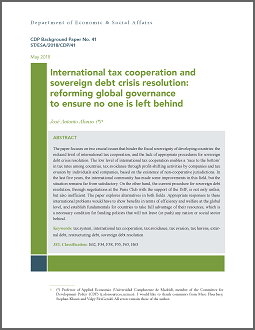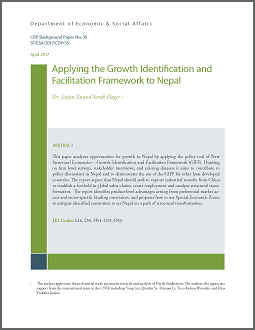Document_CDP: CDP Background Paper series
CDP Background Paper series
17 May 2018
The paper focuses on two crucial issues that hinder the fiscal sovereignty of developing countries: the reduced level of international tax cooperation, and the lack of appropriate procedures for sovereign debt crisis resolution.
9 April 2018
The paper examines whether the planned eradication of poverty to the year 2030 part of the SDG strategy is compatible with the expected trends in key economic variables such as GDP growth, population growth, income inequality and food prices.
26 March 2018
This paper presents some of the challenges of the “leaving no-one behind” mandate.
9 February 2018
This paper explores the challenges countries face in negotiating trade and investment agreements that could restrict their ability to manage access to medicines and the public health systems more generally.
2 February 2018
For identifying concrete policies and strategies that helped LDC in building productive capacities, the CDP reviewed the experiences of fourteen countries in developing productive capacity and the implications for graduation and economic transformation.
10 May 2017
Half a century after its launch the CDP remains at the forefront of international development thinking, providing innovative, timely and practical advice from across the disciplines.
10 May 2017
This paper analyzes opportunities for growth in Nepal by applying the policy tool of New Structural Economics – Growth Identification and Facilitation Framework (GIFF).
12 April 2017
This paper examines the process of building productive capacity in Ethiopia over the past two decades and the roles played by the state, government, the private sector, foreign firms and development partners.
11 July 2016
This paper attempts to identify different LDC clusters in which underdevelopment is caused by specific economic and social conditions.










Follow Us